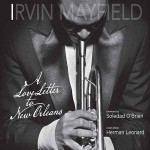Irvin Mayfield has called his tutelage under Wynton Marsalis “probably the largest influence on my life.” Adopting the Wynton model of jazz musician as historian/entrepreneur/statesman, Mayfield has evolved into a Grammy winner, club owner, cultural ambassador, and board chair, all before his 34th birthday. With the addition of “author” to his ever-expanding brand portfolio comes a chance to reexamine his relevance and worldview.
In A Love Letter to New Orleans, Mayfield collects 64 glossy pages of photographs and reflections, each chapter corresponding to a track on an enclosed greatest hits CD. The result is an impressive coffee table book dedicated to a career in New Orleans music. It is also a lost opportunity.
Let us begin by revisiting that Wynton model. Amidst the ruins of fusionists and declining record sales, Marsalis declared that jazz should be defended and exulted as America’s classical music, the masters’ names etched in Lincoln Center marble. Through decades of creative articulation and savvy business dealings, he accomplished that goal.
But while building that tower on Columbus Circle, Wynton also stated what he didn’t like about the landscape as he found it, in particular the image of jazzman as junkie/minstrel/proto-rapper. These critical theories made him a culturally important voice in America; in New Orleans, one wishes Mayfield had used his first book to start (or settle) a few fights of his own.
For example: the book’s penultimate photograph captures the entrance to Armstrong Park, reminding a local reader that there is a backstory amidst all this statesmanship, and that those gates remain locked. We could all benefit from a clarification. Similarly, there is no mention of his businesses nor his views on Bourbon Street. Instead we get a sampler platter of New Orleans culture, a safe bet commercially and nationally. Artistically and locally, Mayfield could say so much more.
For the tourist in search of a memento from her night in the club, A Love Letter to New Orleans will outshine other choices on the gift shop shelf. Famous people, exotic locations, heartfelt tributes, and even a few Mardi Gras Indians provide a narrative for a disc of sophisticated music. Mayfield writes as he plays—very thoughtfully, careful to name his passions and influences. There exist countless myths, fissures, mysteries, and blood stains in New Orleans, some worthy of love letters, others crying out for a new blues. Perhaps one day, a locally-based musician with an international profile will accept that challenge, risking appointments and eminent friends to tackle in text or trumpet the muddy madness of this city. That’s the part of the Wynton model New Orleans so desperately needs. A difficult task, but no one ever said love was easy.





